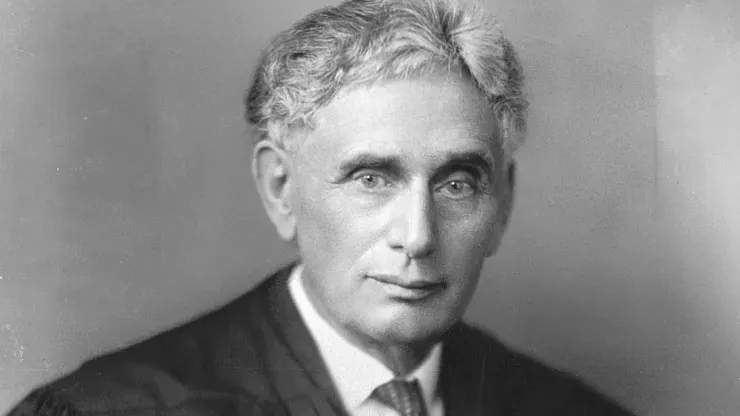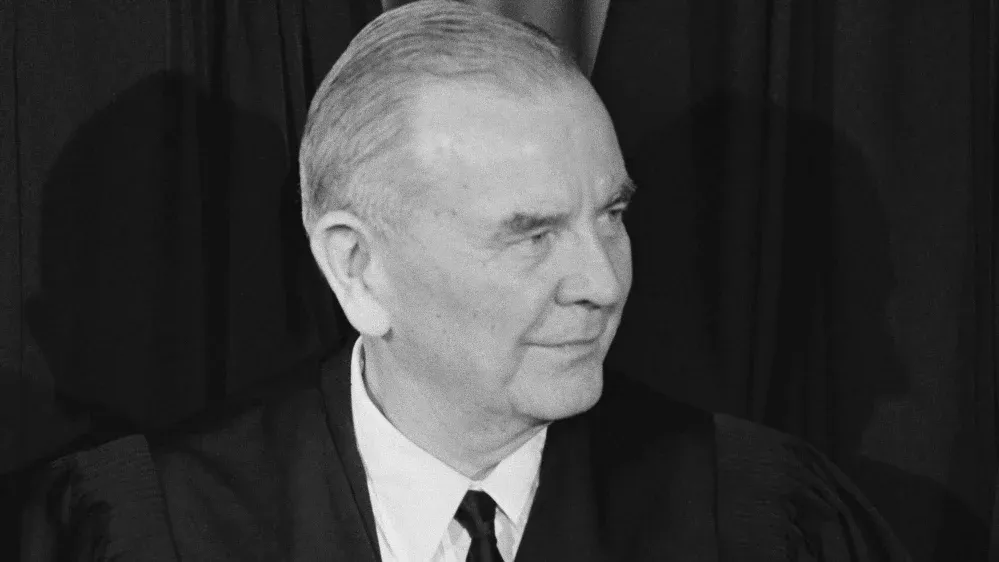Louis Brandeis stands as a towering figure in the annals of American legal history, renowned for his pioneering contributions to privacy rights and progressive social causes. Born in 1856 to Jewish immigrants from Prague, Brandeis' early life in Louisville, Kentucky, and subsequent education at Harvard Law School laid the foundation for a career that would span over five decades. His legal philosophy and judicial decisions have left an indelible mark on American jurisprudence, particularly in the realms of individual rights and economic justice.
Brandeis' tenure as an Associate Justice on the United States Supreme Court from 1916 to 1939 was marked by his profound influence on the development of American law. Appointed by President Woodrow Wilson, he was the first Jewish person to serve on the nation's highest court. During his time on the bench, Brandeis made significant contributions to shaping legal doctrines concerning privacy, free speech, federalism, and economic regulation.
The Right To Privacy: Brandies v. Cochrane (1884)
The seminal law review article "The Right To Privacy," co-authored by Louis D. Brandeis and Samuel Warren, introduced the revolutionary concept that individuals possess a fundamental right to be left alone. This notion has since become a cornerstone of modern privacy law across various jurisdictions worldwide. The article's influence is evident in later landmark cases such as Griswold v. Connecticut (1965) and Roe v. Wade (1972), where privacy rights were pivotal.
Fighting Corporate Monopolies: ille Railroad Co v. Mottley (1908)
Brandeis' commitment to economic justice was exemplified in his advocacy against corporate monopolies. In this case, he represented clients who had been unjustly treated by railroad companies, underscoring his dedication to ensuring fairness for all citizens regardless of socio-economic status. This case highlighted Brandeis' belief in regulating corporate power to protect individual rights and promote economic equity.
A Champion For Free Speech: Whitney v. California (1926)
In his influential concurring opinion in this case, Justice Brandeis articulated a robust defense of free speech under the First Amendment. He emphasized that free speech is not only an individual right but also a vital component of democratic governance. His reasoning laid the groundwork for future decisions that expanded First Amendment protections, such as Brandenburg v. Ohio (1968).
Defending Workers' Rights: Muller v. Oregon (1907)
The significance of Muller v. Oregon (1907) lies in its impact on both labor law and gender jurisprudence. It set a precedent for upholding protective labor legislation, influencing subsequent cases such as West Coast Hotel Co. v. Parrish (1936), which upheld minimum wage laws for women. However, it also entrenched gender discrimination by legally justifying different treatment based on sex, a doctrine later challenged by cases like Reed v. Reed (1971) and Frontiero v. Richardson (1972), which began to dismantle legal distinctions based on gender under the Equal Protection Clause. Thus, while Muller v. Oregon (1907) advanced workers' rights in some respects, it also highlighted the complexities and contradictions inherent in balancing labor protections with gender equality.
The Court, in a unanimous decision, upheld the Oregon law, reasoning that the state had a legitimate interest in protecting women's health due to their perceived physical differences and societal roles. The Court's analysis relied heavily on the "Brandeis Brief," which presented extensive sociological and medical data to support the notion that long working hours were detrimental to women's health and well-being. This decision marked a departure from the Court's earlier stance in Lochner v. New York (1904), where it struck down a similar law limiting men's working hours. By accepting the argument that women required special protection, the Court effectively endorsed gender-based distinctions in labor laws.
The Supreme Court case of Muller v. Oregon (1907) stands as a pivotal moment in the history of labor law and gender equality in the United States. The case arose when Curt Muller, the owner of a laundry business, was fined for violating an Oregon state law that limited women to ten hours of work in factories and laundries. Muller challenged the constitutionality of the law, arguing that it infringed upon the freedom of contract protected by the Fourteenth Amendment. The legal issue at hand was whether the state could impose such restrictions specifically on women, thereby treating them differently from men under the law.
The Spirit of Federalism: Erie Railroad Co. v. Tompkins (1938)
The significance of Erie R Co. v. Tompkins (1937) cannot be overstated, as it marked a pivotal shift in American jurisprudence by reinforcing the doctrine of federalism and limiting the scope of federal judicial power. This decision has had a profound impact on the development of procedural and substantive law, influencing subsequent cases such as United States v. Guaranty Trust Co. Of New York (1934), which further clarified the distinction between substantive and procedural law under the Erie doctrine, and Hanna v. Plumer (1964), which addressed the application of federal procedural rules in diversity cases. The Erie decision continues to serve as a cornerstone for discussions on the balance of power between state and federal courts, shaping the contours of American legal practice to this day.
The Supreme Court, in its reasoning, overturned the longstanding precedent set by Swift v. Tyson (1842), which allowed federal courts to apply a general federal common law in diversity cases. The Court, led by Justice Brandeis, held that there is no federal general common law and that federal courts must apply state substantive law in diversity cases. The decision was grounded in principles of federalism and respect for state sovereignty, emphasizing that allowing federal courts to create their own common law would lead to forum shopping and inequitable administration of the laws. The Court's analysis underscored the importance of adhering to the Tenth Amendment and maintaining a clear demarcation between state and federal judicial responsibilities.
The Supreme Court case Erie R Co. v. Tompkins (1937) is a landmark decision that fundamentally reshaped the landscape of federalism in the United States by addressing the interplay between federal and state law. The case arose when Harry Tompkins, a Pennsylvania resident, was injured by a train operated by Erie Railroad while walking along a path adjacent to the railroad tracks in Pennsylvania. Tompkins filed a lawsuit in federal court, invoking diversity jurisdiction, and sought to apply federal common law to his claim. The legal issue at the heart of the case was whether federal courts, when exercising diversity jurisdiction, should apply federal common law or state law to substantive issues.
Brandeis' dedication to privacy rights was further evidenced during his Supreme Court tenure through various decisions related to wiretapping and surveillance practices by government agencies. His dissenting opinion in Olmstead v. United States (1928) laid down principles that were later adopted by the Court, thereby strengthening Fourth Amendment protections against unreasonable searches and seizures.
Beyond his judicial contributions, Brandeis was deeply involved with progressive social causes throughout his life—advocating for economic justice, fair business practices, and public transparency among other issues. He played an instrumental role in establishing savings bank life insurance in Massachusetts aimed at providing affordable coverage to low-income families, thus demonstrating his dedication towards creating more equitable socio-economic structures within society.
Late Career & Legacy
After serving over two decades on America’s highest court bench, Louis D. Brandeis retired in 1939 due to health reasons. However, his influence on American jurisprudence and social policy continues to resonate today.
Brandeis’ legal philosophy centered around the idea of “judicial restraint,” advocating that courts should defer to legislative decisions unless they clearly violate constitutional provisions. This approach was reflected in many of his opinions including those related to zoning laws such as Village Of Euclid v. Ambler Realty Co. (1926), where he upheld a local ordinance restricting industrial development in residential areas thereby setting precedent for future land-use regulations across the country.
A Legacy Of Progressivism: New State Ice Co. v. Liebmann (1931)
In this case, Justice Brandeis famously wrote about states being "laboratories" for experimenting with economic and social policies—reinforcing his belief in federalism and progressive governance.
The contributions of Louis D. Brandeis towards privacy rights, progressive social causes, and American jurisprudence at large cannot be overstated. His commitment towards individual liberties coupled with an unwavering dedication towards ensuring economic justice has left an indelible mark on America's legal landscape shaping it into what we know today.
From fighting corporate monopolies early in his career to championing free speech during his Supreme Court tenure; from advocating affordable insurance coverage for low-income families outside courtrooms to upholding worker’s rights within them—Louis D.Brandeis embodied the spirit of progressivism throughout his life leaving behind a legacy that continues inspiring generations long after him.
Stay Ahead with Etalia.ai
🌟 Discover More with a Subscription 🌟
If you've found this deep dive into Louis Brandeis: advocate of privacy rights and progressive social causes insightful, there's so much more to explore with Etalia.ai. Our platform is dedicated to bringing you meticulously researched content that broadens your understanding of crucial legal and political issues.
✨ Enhanced with AI
This article has been rewritten and enhanced using advanced AI technology to demonstrate improved comprehensiveness, accuracy, and analytical depth while maintaining our scholarly standards.
Originally published: 2/26/2024 | Enhanced: 9/5/2025 | Scheduled for republication: 9/26/2025








